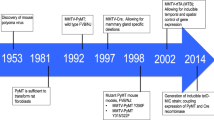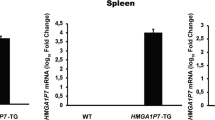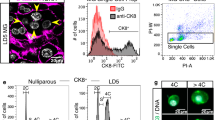Abstract
We recently established transgenic animals (WAP-SV-T/t) carrying the early coding region of Simian Virus 40 (SV40) under the transcriptional control of the whey acidic milk protein promoter (WAP), which restricts the expression of the transgene to mammary gland epithelial cells (ME-cells). SV40 T/t-antigen synthesis causes premature mammary gland involution during late pregnancy by inducing apoptosis and leads to development of mammary tumors after the first lactation period in both p53 positive (WAP-SV-T/t) and p53 negative double transgenic animals (WAP-SV-T/t•p53−/−). The high apoptotic rate persists in all of the T/t-antigen positive breast tumor cells, as well as in established ME-tissue culture cell lines. ME-cells which spontaneously switch off the expression of the WAP-SV-T/t transgene do not undergo apoptosis. However, these cells again exhibit an extensive DNA fragmentation when SV40 T/t-antigen synthesis is reintroduced, which indicates that it is the expression of T/t antigen which is the critical factor for induction of apoptosis. In addition, we isolated several ME-cell lines from different breast tumors which have spontaneously lost the T/t-antigen yet remain maximally transformed. Strikingly, these cells contain a missense mutation of the p53 gene at codon 242 (p53242), which substitutes alanine for glycine. This mutation increases p53 stability and it reduces the transactivating function of p53, albeit without affecting the ability of the protein to interact with the DNA. This indicates that p53 missense mutations are selected for in breast tumors initially expressing T/t-antigen. Therefore, the p53242 mutation is sufficient to maintain the transformed state after the ME-cells have switched off the WAP-SV-T/t transgene. Interestingly, the p53 minus state per se is not sufficient to induce ME-cell transformation since homozygous null mice for the p53 gene (p53−/−) fail to develop breast cancer.
This is a preview of subscription content, access via your institution
Access options
Subscribe to this journal
Receive 50 print issues and online access
$259.00 per year
only $5.18 per issue
Buy this article
- Purchase on Springer Link
- Instant access to full article PDF
Prices may be subject to local taxes which are calculated during checkout
Similar content being viewed by others
Author information
Authors and Affiliations
Rights and permissions
About this article
Cite this article
Tzeng, Y., Zimmermann, C., Guhl, E. et al. SV40 T/t-antigen induces premature mammary gland involution by apoptosis and selects for p53 missense mutation in mammary tumors. Oncogene 16, 2103–2114 (1998). https://doi.org/10.1038/sj.onc.1201733
Received:
Revised:
Accepted:
Published:
Issue Date:
DOI: https://doi.org/10.1038/sj.onc.1201733
Keywords
This article is cited by
-
Karyotype alteration generates the neoplastic phenotypes of SV40-infected human and rodent cells
Molecular Cytogenetics (2015)
-
Chemotherapy resistance of mouse WAP-SVT/t breast cancer cells is mediated by osteopontin, inhibiting apoptosis downstream of caspase-3
Oncogene (2007)
-
Gene expression profiling: cell cycle deregulation and aneuploidy do not cause breast cancer formation in WAP-SVT/t transgenic animals
Journal of Molecular Medicine (2005)
-
HBX causes cyclin D1 overexpression and development of breast cancer in transgenic animals that are heterozygous for p53
Oncogene (2003)
-
New developments about the association of SV40 with human mesothelioma
Oncogene (2003)



